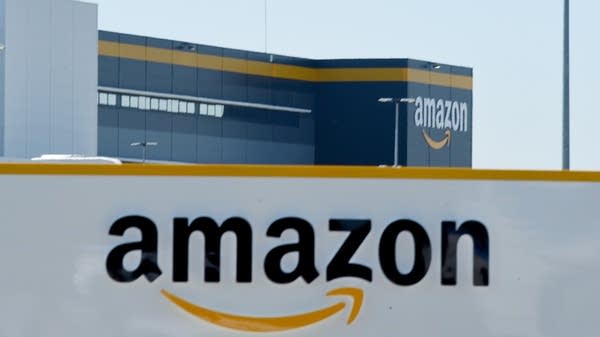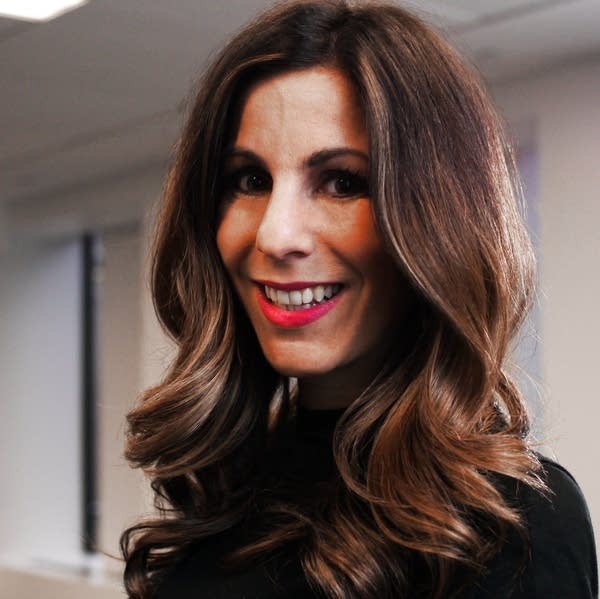Law professor Lina Khan has written about Amazon’s potentially anti-competitive practices. She’s being considered for a seat on the Federal Trade Commission.

Update (4/22/21): Amazon says it does not base counterfeit protection on the payment of marketing fees, counter to Dana Mattioli’s reporting. A full statement from Amazon is below.
The Senate is scheduled to hold a hearing Wednesday on Lina Khan’s appointment to the Federal Trade Commission. Khan is an associate law professor at Columbia University. She published a paper at Yale in 2017 that laid out a new approach to antitrust enforcement, focused on how big tech companies use their power as gatekeepers to harm competitors and consumers. The example she used was Amazon.
I spoke with Dana Mattioli, a reporter at The Wall Street Journal who covers Amazon. In a recent piece, she described some of those behaviors. One example: when the CEO of the PopSockets phone accessories company met with Amazon about counterfeiters. The following is an edited transcript of our conversation.

Dana Mattioli: There were a lot of knowing glances and an offer from Amazon, that if he paid $1.8 million in marketing and advertising spend, his counterfeit problem would go away. And he did. He felt like he had no choice but to pay that. And overnight, it got cleaned up.
Molly Wood: Do you have a sense of how common “offers” are like that from Amazon?
Mattioli: So Amazon, because they’re one of the last remaining conglomerates and because they have this concentrated market power in so many different industries, they’re able to leverage that in their negotiations. So our investigation revealed that this is quite common at Amazon because their partners work with them not just on retail — they might work with them on retail but have cloud computing with [Amazon Web Services], and they might have marketing with them on their streaming devices — that they’re able to leverage that when these partners come to the table on terms, and they’re able to, in the words of the partners, abuse it in these negotiations.
Wood: You also mentioned instances where Amazon asked for customer data from smaller sellers. Is that, do you think, equally common?
Mattioli: That’s very common. Amazon has this line of Echo products that are speakers in people’s homes. Those are listening in the background, collecting a lot of data. Amazon also builds other “smart home” products, so they have this pipeline of thousands of companies that work with them on being Alexa-enabled. And in essence, that gives them more of a footprint in these people’s homes. And more recently, Amazon has been asking them not just for the data when a customer asks Alexa to do something on their devices, but for the data whenever there’s a change in any sort of state in the house. I’m not using Alexa, but [if] I have my device open my garage or lock my doors, they want to know that. And that makes some companies fearful because Amazon, while they’re a partner, they’re also a main competitor. And they don’t want to arm them with more data than they need.
Wood: Right. I mean, that all should be understood in the context that Amazon often creates its own products that, in some cases, replicates, let’s say, products that exist on its platform.
Mattioli: That’s right. We had a big series on that — two, actually. Two investigations on that very issue. So sellers are worried about Amazon. They need to be there because that’s where nearly half of e-commerce happens in the U.S. But they’re worried that [Amazon’s] massive private-label arm is going to see what works and what doesn’t work and copy their products. And at the same time, they have this venture capital arm that invests in startups. And as part of that process, you have to meet with Amazon and do due diligence. And what we found is that a lot of those companies that do meet with Amazon wind up getting ripped off by Amazon’s products.
Wood: Let’s go back to this kind of quid pro quo — or there’s a legal term for these offers that Amazon makes. “Tying,” right? Can you tell us what that means?
Mattioli: Yeah. So there’s a term in antitrust lingo called tying. And that’s when a company says they condition working with them, working with one arm of them, they only allow you to do that if you work with another. [For example,] “You can only work with our retail side if you work with our cloud computing side and spend money there.” And that’s sort of how it would work in reality. And we’ve seen that be the basis of antitrust claims from everyone from Standard Oil to Microsoft, as it relates to big antitrust cases where companies have been forced to break up or have other concessions.
Wood: We are mostly talking about this right now in the context of e-commerce and retail. But it’s not just about sellers on Amazon, right? It’s part of why it took so long for HBO Max to get on Prime Video.
Mattioli: Yeah, that’s right. So HBO Max was obviously a new service launched last year. And for a long time, HBO had been on Prime Video, which is part of the Prime program at Amazon. And as they were launching this new premium product, they decided that they didn’t want to be on Prime Video anymore because Prime Video takes up to half of your revenue from subscribers, and you have to hand over all your data. So as they entered negotiations, they said, “We just want to be on your Fire TV streaming device,” which is a normal ask. And Amazon said, “No, you have to be on both.” And that held up HBO Max from being on customers’ Fire TV and Prime Video devices for over six months. And Amazon talked a lot about being customer-obsessed. And the people I spoke to said, “How is that in the best interest of the customer, that they can’t get access to programs that they want?” So it seemed like a little bit of hypocrisy there.
Wood: What has Amazon’s response been to your reporting and to all of this swirling antitrust question?
Mattioli: Amazon has a very standard defense. They say that big does not necessarily mean bad, and that they are good for the consumer. And they really rely on this part of antitrust parlance, called the consumer welfare standard. And they say, “We are working on behalf of the customer. We are lowering prices for the customer. So if you look at those use cases, we are not an antitrust threat.”
Wood: And in fact, as we’re having this conversation, Lina Khan’s nomination to the FTC is having a hearing. And this is the person who essentially made this argument — that Amazon specifically could be an example of a new lens for antitrust enforcement. Do you feel like the examples you’ve uncovered make that point?
Mattioli: I think they align a lot with the cases that she’s made. If you go back to her 2017 blockbuster Amazon antitrust manifesto, she argues that Amazon’s own private brands should be separate from their retail arm. And our investigations have shown examples where there might be abuses of power because those two businesses are combined.
Amazon spokesperson Jack Evans says, “Amazon always tries to negotiate the best terms for our customers – we would be doing them a disservice if we didn’t. And it shouldn’t surprise anyone that we negotiate across our business units – that’s normal practice anywhere. Many of our customers and partners do this, and usually are seeking to include other aspects of our business in their agreements with us.
Also, regarding the specific claim that you start the segment with, we have said previously that the claim by PopSockets is not true. Amazon does not base counterfeit protection on the payment of marketing fees. Not now. Not ever.”

As it happens, executives from Google and Apple are also scheduled to testify before the Senate about antitrust issues and their app stores Wednesday. But not Amazon — at least not yet.
Here’s the story Dana wrote with co-author Joe Flint in the Journal, and more reading that homes in on this idea of the company as a gatekeeper for all the smaller companies that want to sell goods on its platform unimpeded.
Here’s also Khan’s law review piece. The paradox, she wrote, is that Amazon is incredibly dominant, sits at the center of e-commerce in America and serves as “essential infrastructure” for the businesses that depend on it. Yet it has, or at least had, escaped antitrust scrutiny. Since Khan wrote it, regulators around the world have started to coalesce around the concept that if a company has a highly successful business and also controls access to lots of other businesses through its own successful business — that could be a problem for the competition. This is at the heart of Yelp’s yearslong complaints against Google, Spotify’s lawsuits against Apple, and it will be the gist of the hearings Wednesday, which will focus on Apple’s App Store and Google Play.
For Apple’s part, the company Monday announced a change to its operating system that makes data tracking by apps for advertising purposes opt-in, rather than opt-out. Small developers say this could devastate their businesses since most users won’t opt in. And Apple also announced AirTags — little gadgets that help you find your other gadgets or keys and that compete directly with Tile, a company that’s been selling gadget-finder tags for over 10 years. Tile will testify at the hearing Wednesday as well. It put out a statement in advance, saying Apple’s privacy practices have adversely affected how its app works on iPhones and that things really started changing in 2019, when Apple created an app that competes with what Tile does.